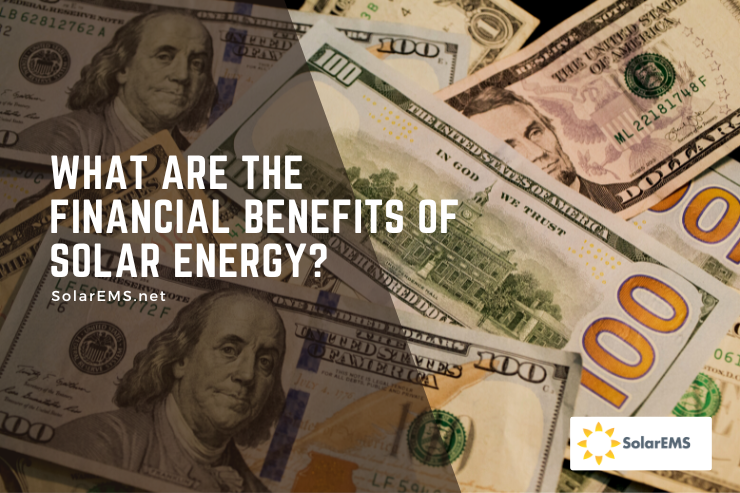Often we have come across various benefits of solar energy such as the use of a renewable source of energy, saving the environment, less carbon emission, etc. but it is not limited to that only but goes more towards saving money. In this article, I’ll tell you what are the financial benefits of solar energy that you will get along with the tax credits.
List of financial benefits of solar energy
- Save on electricity bills
Saving electricity bills per month is one of the financial benefits of solar energy. Purchasing and installing a solar panel at your home and office place can be less costly than you might think. You can save at least $10,000 in your over a complete lifetime by installing solar panels in your home and office.
Net metering is one of the tools that you can install on your electric grid and the electricity produced by the solar energy will go to the grid which will provide you a monthly credit from the electricity service provider. Hence, it will reduce your overall electricity costs in the coming months.
- Tax savings benefits
You can save on the yearly amount of taxes you pay to your state and federal government in the form of solar tax credits. The current federal solar tax credit is offered at 30%. Suppose, if you have installed the solar PV system for $18,500, then you will get the tax credit of ($18,500 * 30%) which is equal to $5,550. You can claim this tax credit for the upcoming five years when filing tax returns. Apart from that, you will also get state tax rebates and other incentives depending on which state you live in.
- Increases market value of your home
When you sell your home, then you can transfer the solar panel system ownership to the buyer and thereby it increases the worth of your residential property. The value of your home can rise to more than 4% if it has a pre-installed solar panel system. This will increase the true value of the property along with tax credit to the prospective buyer.
- A cost-saving option in power cuts
As the alternative in times of power cuts, you end up installing heavy inverters that can cost you thousands of dollars. The better option is to install battery storage that can store the electricity from the solar panel when it gets direct sunlight which can be used at the time of power cuts. If your panels are generating more electricity than what you need, then this will not get wasted and can become a cost-saving option in power cuts.
- Reduces overhead expenses
Overhead expenses are the main concern for all individuals be they, homeowners or business owners. With the installation of solar panels, you don’t need to worry about overhead expenses because less usage of the electrical grid will reduce the cost of managing them. Businesses can reduce their overhead costs of electricity by 75% by switching to solar energy.
- Warranty features
The solar panel system comes with a warranty period of two to three years and hence you do not have to incur the cost of maintaining them. The manufacturer will take care of all of the servicing and equipment replacement costs on behalf of you which otherwise you have to pay while using the non-renewable source of energy.
- Saves cost for the overall economy
Another one of the great financial benefits of solar energy is that it is not only a money-saving option for the individual homeowner but for the overall economy as well. Every unit of electricity produced by your solar panel will reduce the need of producing electricity from power plants. These power plants are not just costly but also harm the environment significantly which eventually impacts the health of the citizens from pollution and rising costs to treat any ailment caused by that.
- An alternative in times of rising electricity cost
Every year we see the rising electricity cost by two to ten percent from our electricity service provider. The best alternative for that is to use solar energy for which the cost of electricity does not rise when the electricity cost rises. Once you successfully install the system, your total expenditure on electricity will reduce drastically.
- Can be installed without the cash
If you don’t have enough cash to install the solar panel, then there are several other options for financing them, which are listed below:
- You can take a loan from banks, credit unions, or sellers. The different types of loans are personal loans, PACE (property assessed clean energy) loans, home equity loans, home equity lines of credit, and Government loans.
- You can purchase a solar panel on lease from a solar installer, or any other financer. You can pay a fixed monthly installment to the owner of the solar panel system for which the lease duration can be 20 to 25 years.
- You can also get into the power-purchase agreement (PPA). In this method, you will have to make payments to the solar panel system’s owner based on the rate per kilowatt-hour of electricity used.
How Can You Save Taxes by Using Solar Energy?

If you think about how to save on taxes and get the financial benefits of solar energy, then saving on taxes is one such great benefit. You will get the federal tax credit or the Investment Tax Credit (ITC) on the income tax you pay for every amount. Suppose you have claimed $100 for federal tax credit then it will reduce the income taxes by that same amount.
Similarly, this way you will get the federal solar tax credit which can be claimed on the yearly taxable income as a percentage of a solar panel’s installation cost. There is no such limited amount that you can claim every financial year. For claiming the federal solar tax credit, you are required to fill up the IRS form 5695 and attach it to your federal tax return file.
Federal Solar Tax Credit Rates
- The solar panels installed before 31st December 2019 can claim a 30% federal solar tax credit.
- The solar panels installed between 2020 and 2021 can claim a 26% federal solar tax credit.
- The solar panels installed between 2022 and 2023 can claim a 30% federal solar tax credit.
- The solar panels installed in 2033 and 2034 can claim a 26% and 22% federal solar tax credit, respectively.
- From the year 2035, no such tax credit facility will be provided, if Congress doesn’t renew it.
Eligibility Criteria for Federal Solar Tax Credit
- The solar panel system has to be installed at a residential place between 1st January 2017 to 31st December 2034.
- Tenants from cooperative housing societies can claim a federal solar tax credit if they have spent on purchasing the solar panel system. However, if an owner has incurred the cost then the tenant cannot claim it.
- The installed solar panel system need not be connected to the grid, only the usage for electricity generation can attract the benefit of the federal solar tax credit.
- If the property is being used for both residential and business purposes, then the residential part can be claimed for the individual tax credit, and the business part is claimed for the business’s tax return.
- The solar panel system purchased in cash or through financing from the seller can only be eligible for the federal solar tax credit.
- The solar panel system purchased on lease or PPA will not be considered for the tax credit.
- Other expenses such as interest payments and extended warranty fees are not considered for the tax credit.
Expenses Claimed for Federal Solar Tax Credit
Here is the list of expenses that are taken into consideration while claiming the federal solar tax credit:
- Solar panels or solar cells used for giving power to the attic fan.
- Contractor cost for installing and assembling the parts.
- The cost incurred on wiring, inverters, and other equipment.
- The energy storage devices installed are of capacity equal to or more than 3kwh in the same year as the solar panel system is installed.
- Sales taxes paid on the above-mentioned expenses.
Rebate on Solar Panel System
When you install a solar panel system at your place, the electricity service provider will provide a subsidy and it eventually is considered as a rebate while calculating the total tax credit. Suppose, if you have installed the solar panel system in 2022 at a total cost of $20,000 and you have got a rebate of $1,200, then your tax credit will become ($20,000 – $1,200) * 30% which is equal to $5640.
Rebate from State Government
The rebate received from the state government does not reduce the amount you get as a federal solar tax credit. Continuing with the above example, the federal tax credit, in this case, would be ($20,000 * 30%) which is equal to $6,000.
Renewable Energy Certificates Income
When you sell your renewable energy certificates to any other buyer or your electricity service provider, the income will be taxable but it does not reduce the amount you get as the federal solar tax credit.
Effect of State Tax Credit
If you claim the state tax credit for installing solar panel systems then you can’t claim the same in federal solar tax credit and that would be the same for the other way round as well. The total taxable income will be more on your federal tax report because you have paid less to the state. Hence, the amount you get as a state tax credit will be taxed at a federal level.
Conclusion
Therefore, the financial benefits of solar energy are ever-lasting along with its eco-friendly benefits. It is very important to choose high-quality solar panels to get the most out of your investment. It will give rise to your property’s market value, lower the monthly electricity bills and ease out the overhead expenses.
Frequently Asked Questions (FAQs)
What is the economic benefit of solar energy?
The economic benefit of using solar energy is the reduction of carbon emissions that otherwise would be there by using the non-renewable source of energy. This will lead to the reduction of cost to install the power plants that the government would incur and afterward manage them.
What are the 3 benefits of solar energy?
The three major benefits of solar energy are a reduction in monthly electricity bills, federal solar tax credit, and an increase in the property’s market value.
What are the long-term benefits of solar energy?
The long-term benefits of solar energy are reduction in carbon emissions than any other electrical energy. It reduces the level of greenhouse gasses and water pollution. The solar panels are very easy to maintain and can be cleaned by anyone. Normal power plants require regular maintenance which can be done by professionals only.
What are the benefits of solar energy in daily life?
The benefit of solar energy in daily life is that it can be used in any place such as residential, commercial, or office buildings. It can be used to give electricity to the lights, and ACs, cook food, heat water and run machinery. Also, the solar energy can be stored in the battery which can be used at the time of blackouts or at night when no sunlight is there.
What is the scope of solar energy?
The scope of solar energy is generating power, heating, and lighting. It will reduce the dependence on fossil fuels which are exhaustible and expensive and it will eventually reduce the overall cost incurred by the government. It can help create new jobs in the solar energy industry and also helps in producing and supplying electricity in remote and rural areas.
This article is better than any other article on the internet because it does not tell only about the theoretical financial benefits but more about the practical benefits which solar energy can provide. It indicates the points through which one can save on yearly taxes.
Meet the Authors
Brantley Edison is a highly experienced and accomplished writer in the field of solar energy. With over a decade of experience in the renewable energy industry, Brantley has contributed significantly to the growth and adoption of solar energy across various sectors. He has worked on several large-scale solar projects, including the design and installation of solar energy systems for commercial and residential properties.
Brantley holds a Bachelor's degree in Electrical Engineering and a Master's degree in Sustainable Energy. His educational qualifications and hands-on experience have given him a deep understanding of the technical aspects of solar energy, and he is well-versed in the latest trends and advancements in the industry.
Brantley's writing is highly informative and engaging, with a focus on educating readers about the benefits of solar energy and promoting sustainable practices. His expertise and contributions to the solar energy industry make him a valuable resource for those interested in adopting solar energy solutions.

